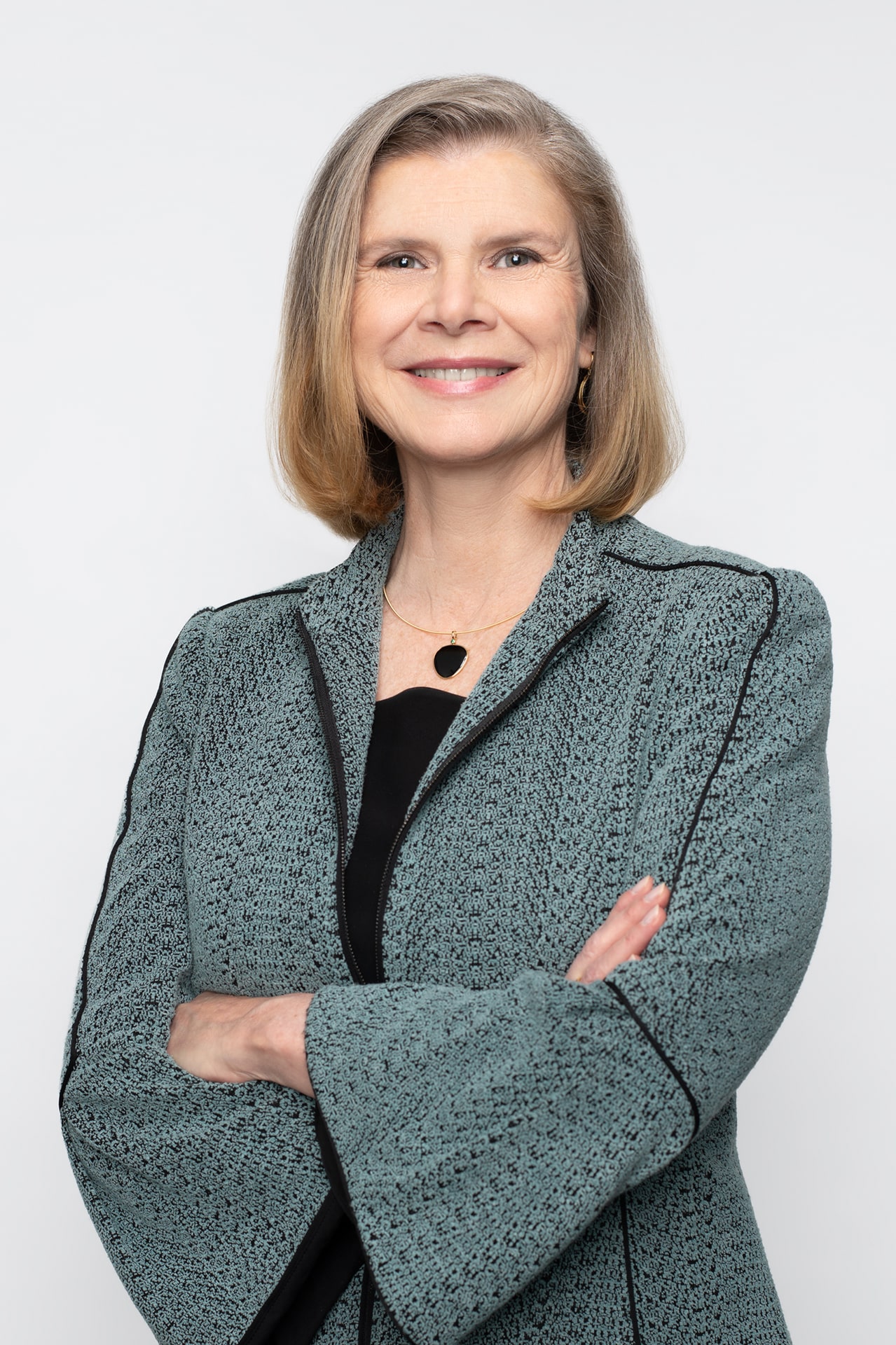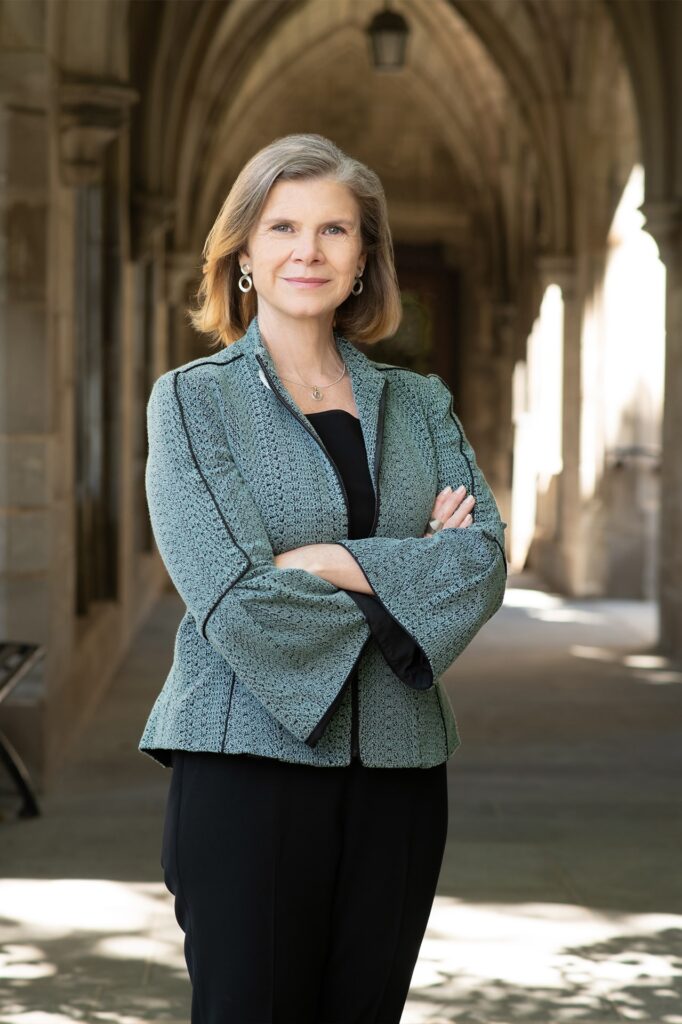
Angela V. Olinto
Albert A. Michelson Distinguished Service Professor of Astronomy and Astrophysics – Dean, Division of Physical Sciences, The University of Chicago
From the beginning, Angela Olinto didn’t quite fit the model. As a girl growing up in Rio de Janeiro, Angela loved soccer, volleyball, and swimming. Angela’s mother preferred she study ballet, like her younger sister. “She was worried about me being feminine enough,” says Angela. She admits: “I was a bit of a tomboy.”
Still, she took up ballet as her mother wished. There are rules and expectations governing behavior; she understood that. It was a fitting insight for someone who’s spent her career exploring the forces that guide how matter behaves—not only in this world but in others far stranger.
Fast-forward several decades. Today, Angela is Dean of the Division of Physical Sciences at The University of Chicago and a leading researcher in the field of astroparticle physics. It’s a branch of science that weaves together what we have learned about quantum mechanics—that is, how sub-atomic particles, or the tiniest bits of matter, operate—with astronomy and cosmology, which investigate the nature and origins of the universe and, by extrapolation, its future.
Think: This is not just understanding the essence of the atom and the rules governing its microbehaviors, but also how those elements came into existence at the beginning of time. It’s a little like Ancestry.com for quarks, leptons, gluons, and Higgs bosons, et al. However, imagine all your ancestors don’t die but are still crashing around and coupling/uncoupling to constantly create more relatives—new neutron stars, gamma-rays, neutrinos, cosmic magnetic fields, and dark matter.
“In physics,” says Angela, “just four rules explain everything. And they’re simple. It gets complicated when you apply those rules everywhere, because the universe is huge. But those rules are simple. And they’re so beautiful.”

Born in the U.S., Angela moved back to Brazil with her parents at age two. When her parents divorced, she relocated to Brasilia, the capital, to live with her mother. She visited her father on holidays. She’d always thought he was an engineer, since that had been his focus from the time she was young. But as she prepared to take the entrance exams for college, she told him she thought she might major in Physics. “Perfect!” he replied. That had been the subject of his doctorate. “Physics,” he told her, “is the best thing ever.”
At age 16—two years ahead of schedule—Angela entered the Pontificia Universidade Católica of Rio and bloomed. After four years of college, she told her mother she wanted to pursue a Ph.D. in Physics at M.I.T. “When do you finish studying and start a normal job?” her mother asked. “Ah, Mom, if I have it my way, I will be studying the rest of my life,” answered Angela.
However, she almost didn’t get her wish. In her final year of college, Angela developed polymyositis, an autoimmune disease that lays waste to the muscles. Too weak even to walk, Angela applied to M.I.T. from her bed. She was still recovering when she headed to Boston and her doctoral studies.
A different world—a strange world, to her view—awaited her there. At Pontificia Universidade Católica, professors were both men and women. At M.I.T., all her teachers were male, and so were most of the students. Just one other woman was studying Physics alongside Angela. She left.
“Most of my peers didn’t think I would make it and didn’t know why I was there,” says Angela. Even meeting a colleague for coffee could be awkward; was he there for coffee or something more? The few women in different specialties at M.I.T. huddled together once a week just to talk and encourage each other.
Yet Angela’s time at M.I.T. also opened a door. She started out exploring the nature of quarks for her doctoral research. But one day an announcement for the Ettore Majorana School of Particle Astrophysics in Sicily caught her eye. The interface between particle physics and astronomy was just emerging then. Angela redirected her thesis to look at the nature of neutron stars, the densest form of matter in the universe (beside black holes), in which formerly distinct atomic particles have been crushed together so intensely that they operate in unfamiliar ways. Her 1987 thesis—called Strange Stars—is still cited.
Her research led to a post-doc appointment at Fermilab near Chicago and eventually to a teaching position at The University of Chicago, where today she is the Albert A. Michelson Distinguished Service Professor of Astronomy and Astrophysics. She is also the Principal Investigator of the POEMMA (Probe of Extreme Multi-Messenger Astrophysics) space mission as well as the EUSO (Extreme Universe Space Observatory) investigation. These efforts are looking for the source of ultrahigh-energy cosmic rays beaming toward earth from someplace outside the Milky Way—the highest-energy objects ever detected. Angela was also a founding member of the Pierre Auger Observatory in Argentina, for which she helped define the science goals. Furthermore, she is a fellow of the American Physical Society and the American Association for the Advancement of Science. Additionally, she has served as advisor to the National Academy of Sciences, the U.S. Department of Energy, the National Science Foundation, and NASA. To honor her many contributions, she was elected to the American Academy of Arts and Sciences and to the U.S. National Academy of Sciences in 2021.
She has built a life studying the forces of attraction and repulsion that govern us all. And in her years as department chair and dean, she has seen women scientists come and go.
“I am so happy with this current generation that’s aware we should value ourselves more,” says Angela. “The first women hired were so thankful just to get a job. They were like, ‘Wow, you actually noticed me. Thank you! Thank you! I don’t care what you pay.’
“Being a woman is hard,” she continues. She remembers being the first female in the history of her department to win tenure. She did it while also running a household of three teenagers with a husband who was mostly traveling. “The expectations are that we’ll be gorgeous, completely organized, great mothers, great wives, and great professionals,” she says. “The pressures are huge. I was always expected to bring the cookies to meetings because I’m a woman. Like, men can’t find cookies? That’s why I say: Let’s be nicer to ourselves.”
And, trust that women can do the work, she believes—even do it brilliantly and in new ways. “Diversity is very important,” she says. “When you bring in new folks who ask new questions, you change the field and the basic sciences. Women want to do great research. But we’re asking, ‘Why do we have this rule? That artificial hierarchy?’ We can be more collaborative.”
“And I’ll tell you this,” she adds. “When men suggest we speak with deeper voices if we want to get our message across, here is what I say: Gravity does not care how deep your voice is.”